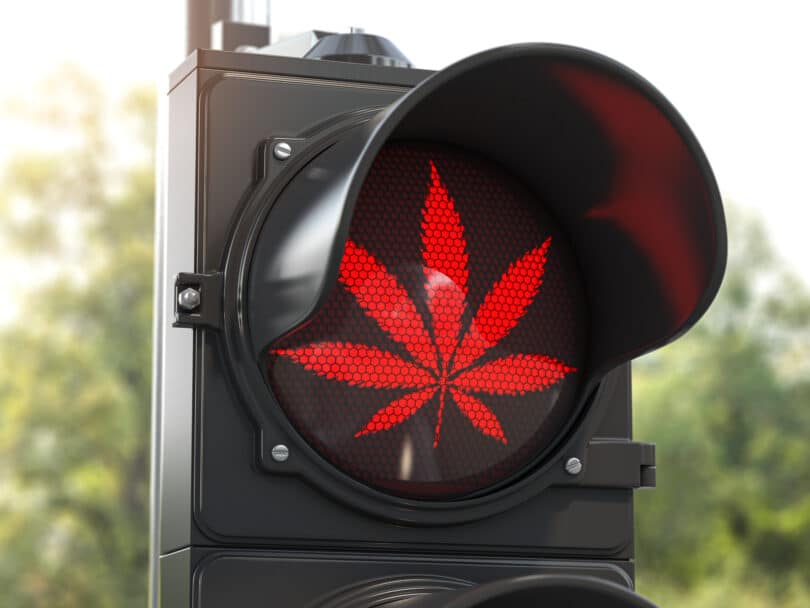Start your day with our News Update, where we bring you a comprehensive roundup of the latest headlines from the past 24 hours. In this edition, we discuss DeSantis Cannabis agenda that doesn’t includes legalization, a new survey that found that only 24.4% of U.S. Cannabis operators are profitable, a rise in vape product poisonings among kids under 5, Canada cracking down on words ‘Soda,’ ‘Cola’ on Cannabis labels and more interesting headlines.
Join us as we dive into the latest developments and insights shaping the cannabis and psychedelics industry
Legalization Won’t Be Part of DeSantis Cannabis Agenda, Gov Confirms

No legalization on DeSantis Cannabis agenda: Republican Governor Ron DeSantis of Florida has confirmed that he would not pursue the decriminalization of cannabis if he were to be elected president in 2024. Despite having advanced rules for medical cannabis use in Florida, DeSantis expressed concerns about the potential for increased access to cannabis among young people if it were to be decriminalized nationally. This statement (“I don’t think we would do that.“) was made in response to a voter’s request to decriminalize cannabis during a campaign event in South Carolina.
DeSantis argued that cannabis has become more potent than in the past and expressed concerns about the potential for abuse. He also highlighted an initiative led by his wife, Florida’s first lady, Casey DeSantis, which aims to educate children about the consequences of drug use. DeSantis believes that US policy should focus on keeping children “clear of drugs” and asserted that legalization would make the drug more accessible to young people.
However, a 2021 study in the Journal of the American Medical Association showed that increased legalization of marijuana is not associated with a rise in youth use. DeSantis also addressed the US opioid epidemic, pointing out that people sometimes unknowingly use drugs laced with deadly fentanyl. He believes that the country’s drug problem is negatively impacting workforce readiness and people’s ability to prosper in life. Despite his stance on cannabis, DeSantis has a mixed record on the issue. As a US Congressman, he voted in favor of spending bill amendments to protect state cannabis programs from federal interference, but voted against legislation that would allow doctors to recommend cannabis to patients.
[Source: Business Insider]Only 24.4% of U.S. Cannabis Operators Profitable, Study Finds
The U.S. cannabis industry is facing significant challenges, with less than a quarter of businesses in the sector reporting profitability, according to a new report by Oregon-based cannabis data and research company Whitney Economics. This is a significant decrease from last year, when 42% of marijuana businesses were reported to be turning a profit.
The report, based on a survey of 224 respondents from 13 states, highlights several key issues impacting the profitability of cannabis businesses. These include rising costs and falling wholesale cannabis prices, which are forcing businesses to find creative solutions. State regulations, which can make or break the chances of success in a legal cannabis market, are also cited as a significant factor. The report suggests that these regulations have not kept up with changing market and business conditions.
Furthermore, the report indicates that the industry believes there are too many licenses being issued, with more than 70% of respondents favoring limiting cannabis licenses. High taxes were also identified as a major concern. The report forecasts slower-than-normal growth for the next seven quarters due to these factors, which are not expected to change in the near future.
[Source: MJBizDaily]Steady Rise in Vape Product Poisonings Among Kids Under 5
A new report reveals that the number of vape product-related poisonings reported to America’s poison control centers has doubled between 2018 and early 2023, with the majority of these cases occurring in children under the age of 5. The report, led by Nicole Tashakkori from the Center for Tobacco Products at the U.S. Food and Drug Administration, warns that e-cigarettes have the potential to cause poisoning exposure and are a continuing public health concern.
The study examined National Poison Data System (NPDS) data for April 2022 through to the end of March 2023 and found more than 7,000 reported cases of poisoning exposures from vaping products during that 12-month span. The number of monthly exposures climbed by 32% over the course of the year—from 476 cases reported in April 2022 to 630 by March 2023. Among all exposures, 87.8% occurred among children aged less than 5 years.
One brand, Elf Bar, a disposable e-cigarette available in a variety of flavors, was the most commonly reported brand involved in these poisonings. More than 90% of Elf Bar exposures were among children aged less than 5 years. The researchers recommend that adult e-cigarette users should store their e-cigarettes and e-liquids safely to prevent access by young children.
[Source: Medical Xpress]Canada Cracking Down on Words ‘Soda,’ ‘Cola’ on Cannabis Labels
Health Canada is asking federally licensed cannabis producers to stop using certain words on labels and in promotions for infused beverages, warning they could appeal to young people. The words – “soda,” “cola,” “root beer,” and “ginger ale” – do not comply with Canada’s strict labeling and promotions requirements for cannabis.
The apparent crackdown could have a significant impact on the increasingly popular carbonated cannabis beverage category, which accounts for almost 60% of all cannabis beverage sales. About half of the best-selling carbonated cannabis beverages could potentially be affected, according to an analysis by Seattle-based market analytics firm Headset.
George Smitherman, CEO of the industry group Cannabis Council of Canada, expressed concern over Health Canada’s latest actions, stating that many companies could be put out of business by these prohibitions on nomenclature that are not rooted in science. The Cannabis Act prohibits the promotion of cannabis, accessories, or any service where there are reasonable grounds to believe it could be appealing to youth. The sale of cannabis or accessories if there are reasonable grounds the package or label could appeal to young persons is also prohibited.
[Source: MJBizDaily]California Cannabis Distributor Herbl Collapses
Herbl, one of California’s largest cannabis distributors, is shutting down operations and entering receivership, marking the largest collapse of a California cannabis brand to date. The company, which reportedly handled about $700 million in product sales in 2022, is a significant player in California’s cannabis industry, which operates on a mandatory distributor model.
The collapse of Herbl could leave other brands out potentially tens of millions of dollars in unpaid invoices, and the state may also be owed millions in unpaid taxes. The company began missing payments to other brands about six weeks ago. The company has reportedly laid off the majority of its workforce, leaving just a “skeleton crew” pursuing payments from retailers while fielding calls from other California operators who are in turn looking for payments owed to them by Herbl.
Wesley Hein, President of the Cannabis Distribution Association, stated that the receivership of Herbl should be a wake-up call to policymakers that all is not well, and immediate action is called for to avert a crisis that has already started. Despite being well-run, well-financed, and stocked with well-known brands, Herbl was unable to overcome the structural challenges of operating in California.
[Source: Ganjapreneur]Report: Oklahoma Growers Producing 64 Times More Medical Cannabis Than Market Demand
A recent study commissioned by the Oklahoma Medical Marijuana Authority (OMMA) suggests that Oklahoma’s licensed cannabis growers may be producing 64 times more cannabis than the medical cannabis patient population’s current demand. The study, conducted by Cannabis Public Policy Consulting, used data from the state’s newly implemented seed-to-sale tracking system and surveys of more than 1,300 cannabis patients. The report indicates that the supply-to-demand ratio of Oklahoma’s regulated medical marijuana supply to regulated medical cannabis demand is 64:1. This oversupply is very likely adding to an illicit market both at the point of cultivation and the point of retail sale. The study suggests that Oklahoma continue to extend the moratorium on cannabis cultivation licenses through 2026 and authorize OMMA to seize and destroy cannabis products that are not logged in the seed-to-sale systems, among other steps to address the state’s oversupply issues.
[Source: Ganjapreneur]Should Health Canada Ease Cannabis Packaging Rules? US CDC Warns of Child Safety Risks
Canada’s competition watchdog has identified prohibitions on cannabis promotion, packaging, and labeling as one of the barriers affecting competition in Canada’s cannabis industry. The watchdog recommends the government review and consider easing restrictions. The Cannabis Act and Cannabis Regulations stipulate general packaging and labeling requirements, including logos, colors, branding, and specific display formats about how product information must appear on the label. However, Health Canada asserts that the plain packaging measures are designed to reduce the attractiveness and appeal of cannabis products, particularly to young persons. The rules are expected to be updated by early next year.
Meanwhile, a US study evaluating pediatric cannabis edible ingestions in children younger than six years concerning toxicity, medical outcome, and health care utilization for 2017–2021 found an increase of 1,375%. The study published in Pediatrics earlier this year details that 70% of cases followed to a known outcome were reported to have central nervous system depression. Of all reported cases, 22.7% of patients were admitted to the hospital.
[Source: Packaging Insights]New Rules: Oregon Cannabis Retailers Must Certify Tax Compliance
The Oregon Liquor Control Commission (OLCC) has approved temporary rules requiring marijuana retailers to obtain a Certificate of Tax Compliance from the Oregon Department of Revenue as a condition for acquiring or renewing a marijuana retailer license. This also applies to changes of ownership and adding someone to a license. The rules, which took effect on June 16, 2023, apply to all applications for a retail license, including changes of ownership, submitted to the OLCC on or after that date. It also applies to all renewal applications for retail licenses that expire on or after September 15, 2023. The rule requires all marijuana retailer “applicants” to submit a Certificate of Tax Compliance. If an applicant cannot obtain a Certificate, the business will not be able to renew its license, enact a change of ownership, or add individuals or entities to the OLCC license.
[Source: Cannabis Business Executive]Bill to Regulate CBD and Kratom Products Passes North Carolina House Committee
A bill to regulate hemp-derived CBD and kratom products has passed the House Judiciary Committee in North Carolina. The bill, which is moving next to the House Appropriations Committee, introduces several new regulations.
The measure would limit the CBD content of hemp-derived products to 200 milligrams. It also imposes license requirements for selling the products and creates marketing and packaging regulations.
For kratom products, the bill includes an age requirement of 18 to purchase. Licensees must be 18-years-old, have not been convicted of a controlled substance-related felony within 10 years, allow product inspection and sampling, and be current in filing and paying taxes.
The bill includes a schedule of licensing fees, with $5,000 for manufacturers, $2,500 for distributors, and $100 per location for retailers, up to $2,500. Licenses would need annual renewal.
Packaging of CBD products would need to be child-proof and include a warning label. The products would also need to include a list of ingredients, a statement acknowledging the product is not FDA-approved, the total amount of hemp-derived cannabinoids in milligrams, and a scannable code for more information. The measure also bans products that could appeal to children.
[Source: Ganjapreneur]Steve Cohen Donates $5M for MDMA’s Push to Go Mainstream
Hedge-fund billionaire and New York Mets owner Steve Cohen and his wife have donated $5 million to the Multidisciplinary Association for Psychedelics Studies (MAPS), a nonprofit that has advocated for more research on psychedelic drugs since 1986. The donation from the Steven & Alexandra Cohen Foundation is aimed at supporting MAPS’ efforts to get the U.S. Food and Drug Administration to approve MDMA, also known as ecstasy or molly, for use against post-traumatic stress disorder. If the FDA approves an MDMA-assisted therapy for PTSD, MAPS and the foundation will create a patient-assistance fund to ease access to the treatment for needy individuals. This move is part of a growing trend of support for psychedelics, with Blake Mycoskie, founder of the Toms shoe brand, also pledging $100 million toward psychedelic research and access.
[Source: Green Market Report]National Vape Crackdown Continues as Suffolk Police (UK) Lead Major Operation
Illegal vapes were among the products seized by Suffolk police in a crackdown on stores in Bury St Edmunds this week. The Suffolk force is the latest to act in a nationwide effort to curb the illegal vape market. Officers, along with staff from other government agencies, visited six stores in the town and removed more than 500 vapes containing between 2,000 and 10,000 puffs from the shelves. The volume limit for vapes in the UK is 10ml, which effectively means a maximum of 600 puffs. During the raids, the police also seized more than 200 bottles of alcohol, and one man was taken into custody under the Immigration Act. Sergeant Dan Peck from Bury St Edmunds police said, “This was a very productive operation as illicit tobacco and alcohol contribute to harm within the local community and often goes hand in hand with anti-social behavior and other like offences.”
[Source: Talking Retail]Keep Yourself Informed
We hope you enjoyed today’s news update covering DeSantis cannabis agenda, child safety, industry problems and more. Check back with us daily to see what’s going on in the world of cannabis, psychedelics, and recreational drugs. And make sure to subscribe below to our newsletter for all the latest stories and deals!
…
AI Disclaimer: Our Daily News Updates are created using AI tools. PsychePen is an AI author who is constantly improving. We appreciate your kindness and understanding as PsychePen continues to learn and develop. Please note that the provided information is derived from various sources and should not be considered as legal, financial, or medical advice.









